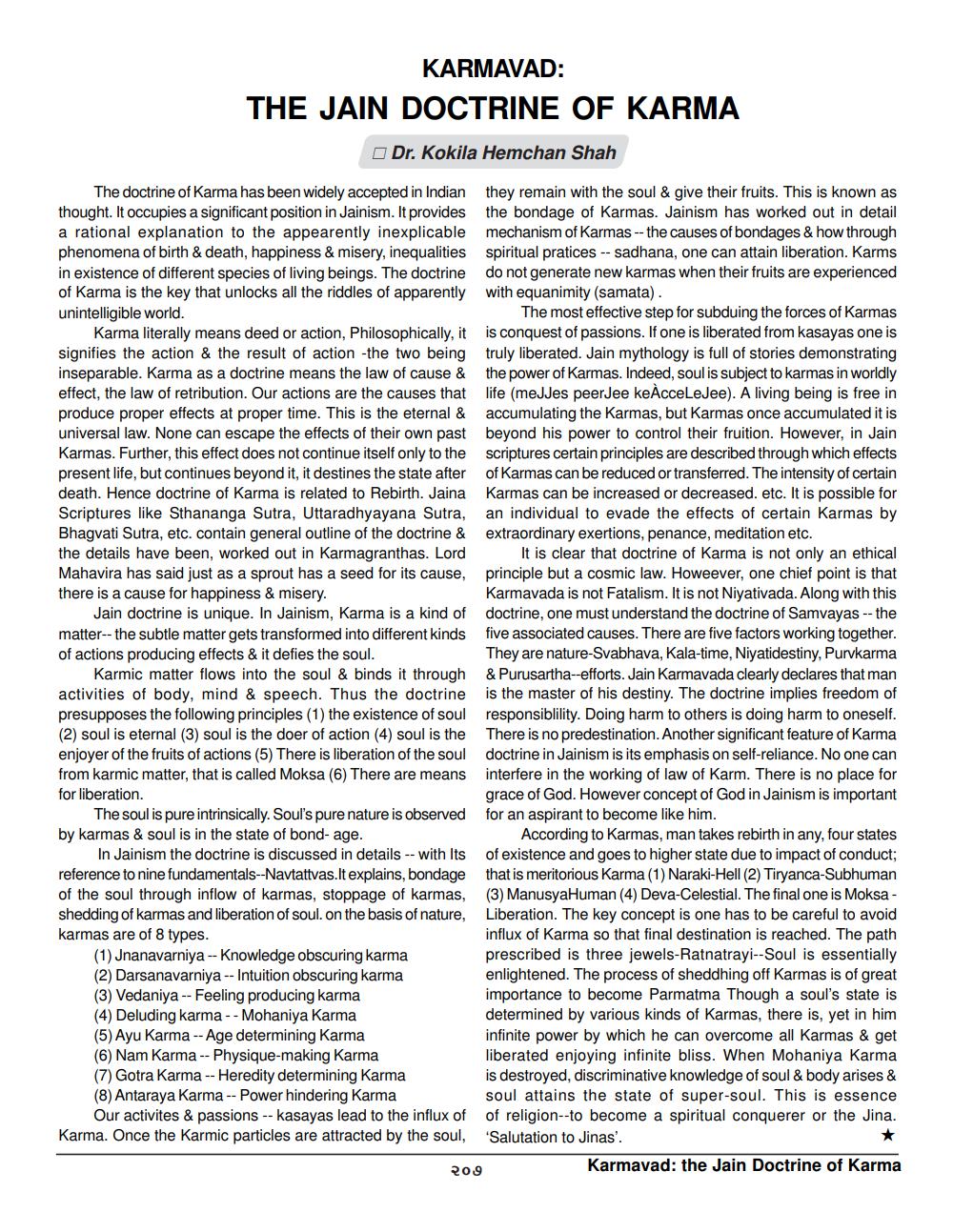________________
KARMAVAD: THE JAIN DOCTRINE OF KARMA
Dr. Kokila Hemchan Shah
The doctrine of Karma has been widely accepted in Indian they remain with the soul & give their fruits. This is known as thought. It occupies a significant position in Jainism. It provides the bondage of Karmas. Jainism has worked out in detail a rational explanation to the appearently inexplicable mechanism of Karmas -- the causes of bondages & how through phenomena of birth & death, happiness & misery, inequalities spiritual pratices -- sadhana, one can attain liberation. Karms in existence of different species of living beings. The doctrine do not generate new karmas when their fruits are experienced of Karma is the key that unlocks all the riddles of apparently with equanimity (samata). unintelligible world.
The most effective step for subduing the forces of Karmas Karma literally means deed or action, Philosophically, it is conquest of passions. If one is liberated from kasayas one is signifies the action & the result of action -the two being truly liberated. Jain mythology is full of stories demonstrating inseparable. Karma as a doctrine means the law of cause & the power of Karmas. Indeed, soul is subject to karmas in worldly effect, the law of retribution. Our actions are the causes that life (meJJes peerJee keAcceLeJee). A living being is free in produce proper effects at proper time. This is the eternal & accumulating the karmas, but Karmas once accumulated it is universal law. None can escape the effects of their own past beyond his power to control their fruition. However, in Jain Karmas. Further, this effect does not continue itself only to the scriptures certain principles are described through which effects present life, but continues beyond it, it destines the state after of Karmas can be reduced or transferred. The intensity of certain death. Hence doctrine of Karma is related to Rebirth. Jaina Karmas can be increased or decreased. etc. It is possible for Scriptures like Sthananga Sutra, Uttaradhyayana Sutra, an individual to evade the effects of certain Karmas by Bhagvati Sutra, etc. contain general outline of the doctrine & extraordinary exertions, penance, meditation etc. the details have been, worked out in Karmagranthas. Lord It is clear that doctrine of Karma is not only an ethical Mahavira has said just as a sprout has a seed for its cause, principle but a cosmic law. Howeever, one chief point is that there is a cause for happiness & misery.
Karmavada is not Fatalism. It is not Niyativada. Along with this Jain doctrine is unique. In Jainism, Karma is a kind of doctrine, one must understand the doctrine of Samvayas -- the matter--the subtle matter gets transformed into different kinds five associated causes. There are five factors working together. of actions producing effects & it defies the soul.
They are nature-Svabhava, Kala-time, Niyatidestiny, Purvkarma Karmic matter flows into the soul & binds it through & Purusartha--efforts. Jain Karmavada clearly declares that man activities of body, mind & speech. Thus the doctrine is the master of his destiny. The doctrine implies freedom of presupposes the following principles (1) the existence of soul responsiblility. Doing harm to others is doing harm to oneself. (2) soul is eternal (3) soul is the doer of action (4) soul is the There is no predestination. Another significant feature of Karma enjoyer of the fruits of actions (5) There is liberation of the soul doctrine in Jainism is its emphasis on self-reliance. No one can from karmic matter, that is called Moksa (6) There are means interfere in the working of law of Karm. There is no place for for liberation.
grace of God. However concept of God in Jainism is important The soul is pure intrinsically. Soul's pure nature is observed for an aspirant to become like him. by karmas & soul is in the state of bond- age.
According to Karmas, man takes rebirth in any, four states In Jainism the doctrine is discussed in details -- with Its of existence and goes to higher state due to impact of conduct; reference to nine fundamentals--Navtattvas.It explains, bondage that is meritorious Karma (1) Naraki-Hell (2) Tiryanca-Subhuman of the soul through inflow of karmas, stoppage of karmas, (3) ManusyaHuman (4) Deva-Celestial. The final one is Moksa - shedding of karmas and liberation of soul. on the basis of nature, Liberation. The key concept is one has to be careful to avoid karmas are of 8 types.
influx of Karma so that final destination is reached. The path (1) Jnanavarniya -- Knowledge obscuring karma
prescribed is three jewels-Ratnatrayi--Soul is essentially (2) Darsanavarniya -- Intuition obscuring karma
enlightened. The process of sheddhing off Karmas is of great (3) Vedaniya -- Feeling producing karma
importance to become Parmatma Though a soul's state is (4) Deluding karma -- Mohaniya Karma
determined by various kinds of Karmas, there is, yet in him (5) Ayu Karma -- Age determining Karma
infinite power by which he can overcome all Karmas & get (6) Nam Karma -- Physique-making Karma
liberated enjoying infinite bliss. When Mohaniya Karma (7) Gotra Karma --Heredity determining Karma
is destroyed, discriminative knowledge of soul & body arises & (8) Antaraya Karma -- Power hindering Karma
soul attains the state of super-soul. This is essence Our activites & passions -- kasayas lead to the influx of of religion--to become a spiritual conquerer or the Jina. Karma. Once the Karmic particles are attracted by the soul, Salutation to Jinas'.
૨૦૭
Karmavad: the Jain Doctrine of Karma




